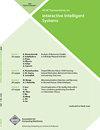用户如何体验人工智能系统的可追溯性?胰岛素自动输送(AID)系统的主观信息处理意识研究
IF 4.8
4区 计算机科学
Q2 COMPUTER SCIENCE, ARTIFICIAL INTELLIGENCE
引用次数: 1
摘要
在与医疗领域的人工智能(AI)交互时,用户经常面临自动化的信息处理,而这些信息对他们来说可能仍然是不透明的。例如,糖尿病患者可能每天都与自动胰岛素输送(AID)互动。然而,有效的艾滋病治疗需要不同用户的自动决策的可追溯性。在人机交互研究的基础上,我们研究了主观信息处理意识(SIPA)作为研究可解释人工智能用户体验的关键结构。本研究的目的是研究用户如何体验不同程度的人工智能算法的可追溯性。我们开发了一个基本的AID模拟,为一个N = 80的实验创建了真实的场景,在这个实验中,我们检查了三个级别的信息披露对SIPA和绩效的影响。将作为胰岛素需求计算基础的属性显示给用户,用户经过60多次观察后预测AID系统的计算结果。反复观察后,结果显示SIPA的差异,与SIPA评分随时间的普遍下降有关。支持量表效度,SIPA与信任和对解释的满意度呈强相关。本研究表明,不同层次的信息披露效应可能需要多次重复才能显现。此外,高水平的信息披露可能导致SIPA与预测系统结果的性能之间的错误校准。结果表明,对于负责任的XAI设计,系统设计者可以利用预测任务来校准经验可追溯性。本文章由计算机程序翻译,如有差异,请以英文原文为准。
How do Users Experience Traceability of AI Systems? Examining Subjective Information Processing Awareness in Automated Insulin Delivery (AID) Systems
When interacting with artificial intelligence (AI) in the medical domain, users frequently face automated information processing, which can remain opaque to them. For example, users with diabetes may interact daily with automated insulin delivery (AID). However, effective AID therapy requires traceability of automated decisions for diverse users. Grounded in research on human-automation interaction, we study Subjective Information Processing Awareness (SIPA) as a key construct to research users’ experience of explainable AI. The objective of the present research was to examine how users experience differing levels of traceability of an AI algorithm. We developed a basic AID simulation to create realistic scenarios for an experiment with N = 80, where we examined the effect of three levels of information disclosure on SIPA and performance. Attributes serving as the basis for insulin needs calculation were shown to users, who predicted the AID system’s calculation after over 60 observations. Results showed a difference in SIPA after repeated observations, associated with a general decline of SIPA ratings over time. Supporting scale validity, SIPA was strongly correlated with trust and satisfaction with explanations. The present research indicates that the effect of different levels of information disclosure may need several repetitions before it manifests. Additionally, high levels of information disclosure may lead to a miscalibration between SIPA and performance in predicting the system’s results. The results indicate that for a responsible design of XAI, system designers could utilize prediction tasks in order to calibrate experienced traceability.
求助全文
通过发布文献求助,成功后即可免费获取论文全文。
去求助
来源期刊

ACM Transactions on Interactive Intelligent Systems
Computer Science-Human-Computer Interaction
CiteScore
7.80
自引率
2.90%
发文量
38
期刊介绍:
The ACM Transactions on Interactive Intelligent Systems (TiiS) publishes papers on research concerning the design, realization, or evaluation of interactive systems that incorporate some form of machine intelligence. TIIS articles come from a wide range of research areas and communities. An article can take any of several complementary views of interactive intelligent systems, focusing on:
the intelligent technology,
the interaction of users with the system, or
both aspects at once.
 求助内容:
求助内容: 应助结果提醒方式:
应助结果提醒方式:


